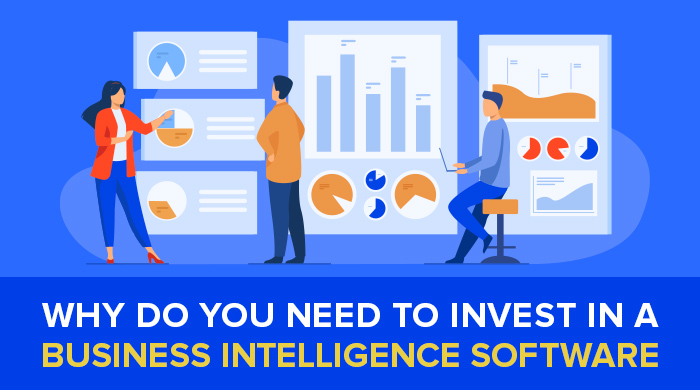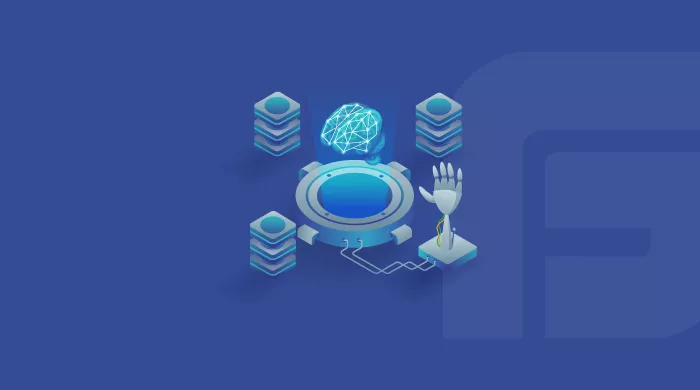In this internet age, possessing relevant data is the key to the success of every business. Predictive analytics help companies grow and gain a competitive advantage. Business intelligence, business analytics, and data science are the terms that we come across often these days when it comes to problem-solving and decision-making.
Business intelligence software helps find and share insights like how much sales were done previously, which product is currently bringing maximum returns on investment, or which distributor is getting the maximum sales. It is all about discovering the hidden insights in your data. In comparison, business analytics is a much narrower process that deals with different elements to derive a descriptive analysis of what and why things happened, eventually leading to the prediction of what can happen in the future. On the contrary, data science deals with bigger data, discovers different data patterns, expanding the possibilities of the current data to derive new opportunities for the future.
Although all these three concepts - business intelligence, business analytics, and data science- sound similar and have the same goal: analyzing the data and predicting the future, yet they are different. So, what is the difference between them? Let's start with the basics of business intelligence, business analytics, and data science and gradually dive deeper into these concepts to help you understand and select the best analytical tools and techniques for your business.
What is Business Intelligence?
Business intelligence is all about using software and services to convert data into actionable insights that allow businesses to make tactical and strategic decisions. A well-featured BI software can access and analyze the data and transform it into analytical reports, graphs & charts, and summaries providing users with detailed real-time information about the current state of the business.
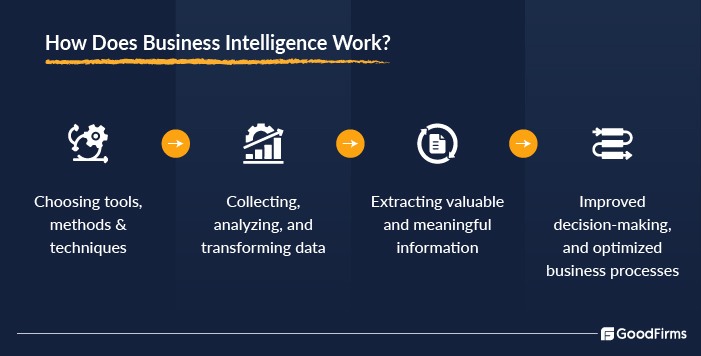
Business Intelligence is not merely generating reports; it is a technique that helps professionals examine data, understand the trends, and acquire insights enabling them to make accurate business decisions. Business intelligence can deliver insights into the current situation of a business organization and provide answers to the questions like how many new customers gained this month, how many sales orders are pending to be delivered to date, or for which product shipping is getting delayed. The answers to these questions enable the professionals to improve their processes and eliminate aspects that may be obstacles to the growth and success of their business.
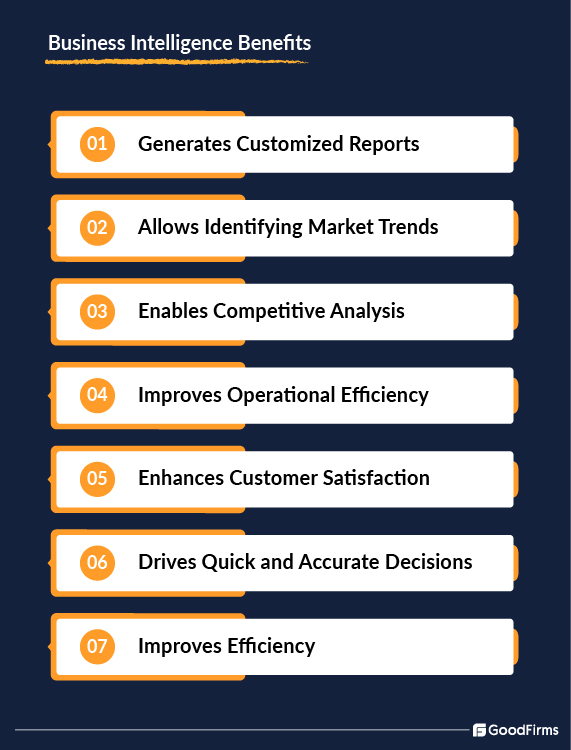
Let's elaborate these benefits of business intelligence in detail -
Generates Customized Reports
Business intelligence software enables you to create customized reports specifically addressing your company's requirements and problems. Whether it is about acquiring information about finances, operations, or sales, BI can help you generate customized reports with the most relevant data helping to take action promptly.
Allows Identifying Market Trends
Identifying current market trends that can impact your business profitability is important to planning strategies and action plans. Business intelligence software helps you closely analyze current market trends and spot problems before they arise.
Enables Competitive Analysis
Business intelligence software helps in planning, forecasting, and budgeting accurately, which goes above and beyond the standard analysis and helps differentiate products and services and their prices from competitors. This eventually helps in enhancing business performance and profitability.
Improves Operational Efficiency
BI tools can integrate data from different departments from the overall organization, so managers and employees need to spend less time accessing information and focus on more strategic tasks like generating timely reports and making decisions based on them.
Enhances Customer Satisfaction
Business intelligence software enables you to understand consumer behavior in real-time. This information can help you comprehend your customers' expectations of your business and make changes in your strategies accordingly, eventually leading to a higher rate of customer retention and revenue generation.
Drives Quick and Accurate Decisions
With the help of business intelligence, one can fetch valuable information from the customers' feedback and predict their demands. Based on that information, businesses can make better manufacturing and supply chain decisions. Also, it enables deciding the prices of the products and services and gaining an edge over competitors.
Improves Efficiency
Business intelligence facilitates businesses to gain a holistic view of their operations and detect flaws hindering their organization's progress. Also, they can identify the opportunities that can help them strategize accordingly and achieve success in their endeavors.
How is BI used in business?
Finance - By data extracting financial information, accounting professionals can determine revenue generated, factors impacting profit and loss, and decisions that can be acted upon.
Marketing - Marketers in an organization can gain real-time insights on the success of the marketing campaigns, measure the performance of products & services, and more that impact the profitability of the business.
Sales - Sales professionals and analysts usually use BI dashboards to know accurate and real-time sales figures, customer loyalty, profit generated, and many other key performance indicators (KPIs) for finding quick solutions to complex problems.
Operations - The operational staff and managers can access and analyze data like supply chain, distribution routes, and customer satisfaction metrics to optimize workflows and improve processes.
Real-World Example of Business Intelligence
Samsung used Business Intelligence to Jumpstart a $1B Product Launch
Challenge - The biggest challenge for Samsung was to know which customer segments were likely to upgrade, which were more interested in older models, and which factors influenced their decision.
Solution - To find the answers to these questions, Samsung turned to an advanced BI tool named Sisu which enabled them to acquire relevant information and answers to their questions relating to new launches within hours that normally would have taken weeks.
Result - The business intelligence tools implemented by Samsung is saving them hundreds of hours every month when they launch new products and they are able to answer 10 times more questions than before.
The Future of Business Intelligence Software
The business intelligence market worldwide is likely to rise from USD 24.05 billion in 2021 to 43.03 billion in 2028 at a Compound Annual Growth Rate (CAGR) of 8.7% in the forecast period.
What is Business Analytics?
Business analytics is a set of components and techniques that work together to provide insights and solve business problems that may occur in the future. Business analytics applies next-generation technologies like machine learning, natural language processing, and data visualization to acquire predicted outcomes that can be useful for planning and strategizing for the future. Through data collection, mining & analysis, quantitative methods, and statistical models, it can derive data-driven predictions about what can happen in the future.
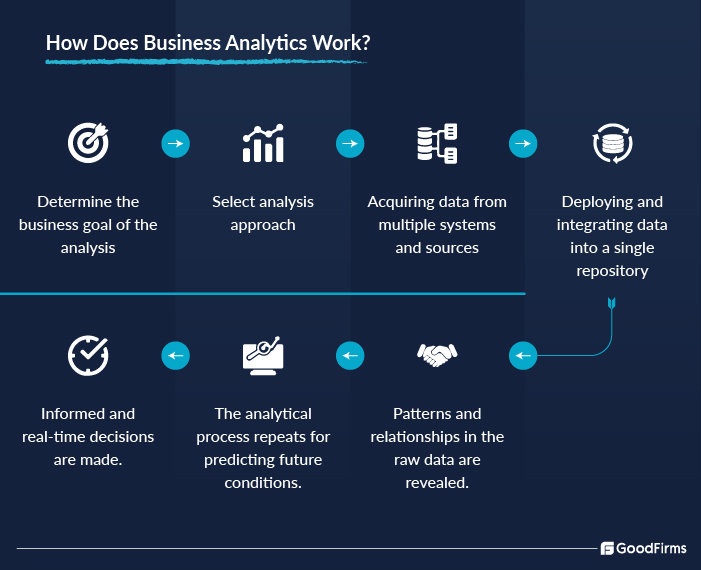
When business intelligence is all about knowing what happened in the past and what is happening currently, business analytics is knowing what will happen in the future. The answers to the questions like which set of audience is likely to respond positively to a particular marketing campaign or how you can increase your profit margins in the future are all answered with the help of business analytics.

Let's elaborate these benefits of business analytics in detail -
Benefits of Business Analytics
Quick Decision Making
Business analytics can suggest what can happen in the future due to the current changes and how businesses should react to these changes. For example, changes in the model of a product can impact customer demand, and after collecting customer feedback about changed products, organizations can use business analytics tools to determine whether to roll out those changes or not.
Powers Agile Business Operations
Business analytics can make operations agile and improve efficiency. For example, gathering and analyzing inventory management data can help you determine the delays in product deliveries and bottlenecks that help determine future problems. If there is a forecast of increased demand for a particular product, it becomes easier for businesses to improve their supply to avoid lost sales and revenue.
Instant Fixtures of Issues
Risks are inevitable in any business. Risks can include legal liabilities, employee theft, uncollected receivables, etc. Business analytics can help you understand those risks before they even arise and implement instant fixtures. For example, a retail store can implement business analytics to predict future risk of thefts and, based on that, determine the type of security measures to be taken.
Prompt Response to Market Trends
Many things change relating to market trends, business operations, and models. Making prompt changes and grabbing the opportunities to make the most out of these market trends benefits the business. Business analytics helps in forecasting the market trends and gathering fresh information about the economy, changing behavior patterns of the consumers, and many more, and implementing strategies that benefit your business.
Improved Customer Service
Through business analytical tools, companies can gain insights about what exactly customers need from various channels, including social media, feedback surveys, etc. Based on that information, businesses are able to provide better customer services and gain an edge over their competitors.
All the above benefits of business analytics lead to increased revenue generation and growth of the business. Now, let's have a look at how analytical tools are used by businesses.
Uses of Business Analytics in Different Processes
CRM - Business analytics is used in CRM to determine significant KPIs like customers' purchasing patterns, their lifestyle, socio-economic status, and more to build stronger relationships with customers.
Manufacturing - Several decisions that impact manufacturing, supply chain management, inventory control, risk management, etc., can be made accurately, allowing better productivity and efficacy.
Human Resources Management - Business analytics help HR professionals identify the right candidate based on their qualifications, experience, expected salary, retention rate, etc., and make the right hiring decisions.
Finance - Different divisions in the financial sector like investment banking, budgeting, portfolio management, forecasting, etc., benefit from integrating business analytics as it can help observe trends and determine future actions that can drive success.
Marketing - From conducting market research to launching a new product, business analytics is involved through all the different stages of the product life cycle and helps analyze consumer behavior and buying patterns to make the right decisions.
Real-World Example of Business Analytics
Uber Applied COTA (Customer Obsession Ticket Assistant)
Challenge - When customers used to contact Uber for support, they had to click through a hierarchy of issue types to report an issue. Although, this was important to find the problem of the customers, not all of the information needed for solving issues was obtainable through this process. The diversity of ways different customers describe a problem complicated the entire process.
Solution - As uber grows in terms of number of customers, the service agents should be able to handle an increasing number of support tickets relating to technical issues and fare discrepancies. To reduce the amount of time spent by agents in solving the tickets became important and for that purpose COTA (Customer Obsession Ticket Assistant) powered by business analytics techniques was designed to help Uber’s customer support representatives improve their understanding, speed, and accuracy towards customer service and enhance their customer experience.
Result - COTA (Customer Obsession Ticket Assistant) has been able to reduce ticket resolution time by over 10 percent simultaneously delivering similar or higher levels of customer satisfaction which was measured by the customer service surveys. The results have been promising as COTA’s powerful ML models have made the Uber support experience seamless and enjoyable.
The Future of Big Data and Data Analytics
The global business analytics market was valued at USD 198.08 billion in 2020, which is expected to reach USD 684.12 billion by 2030 - growth at a CAGR of 13.5% from 2021 to 2030.
So, now that we know what is business intelligence and business analytics, their uses, benefits, and market growth, let us have a look at the fundamental difference between both them before we move on to the knowing about data science -
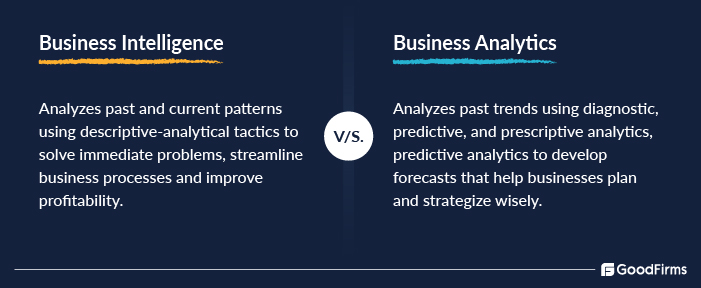
What is Data Science?
Data science refers to the study of the big data by applying statistical techniques and machine learning algorithms to derive meaningful insights from data. Data science-powered tools have the potential to generate data-driven insights that enable businesses to increase their operational efficiency, improve their sales and marketing efforts, and identify new opportunities. This eventually helps business organizations to gain a competitive advantage over others and set new trends and benchmarks.

Data science holds a lot of value for business professionals as it allows them to identify and avoid common mistakes while interpreting metrics, data, and visualizations. It helps businesses understand market size, competition, risks, opportunities, and buyer trends excellently without any flaws, eventually leading to better decision-making and growth in terms of revenue generation. Also, it helps in embracing data-driven decision-making backed by accurate numbers. Data management has a serious impact on BI.
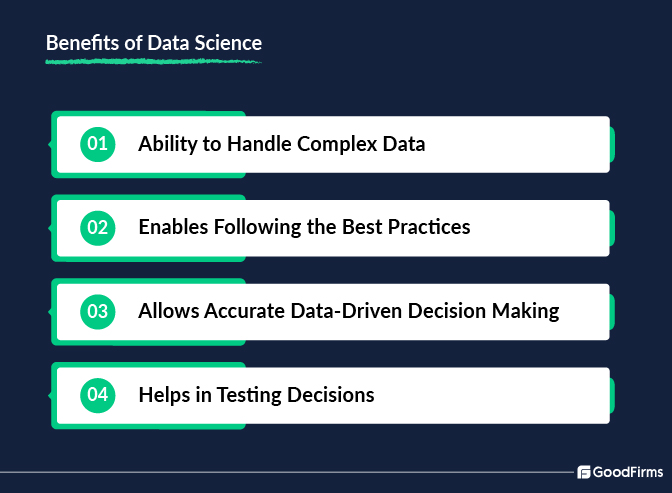
Let's elaborate these benefits of business analytics in detail -
Benefits of Data Science
Ability to Handle Complex Data
Data science can potentially integrate different data sources, including physical and virtual, and help understand the market and business better. A data scientist explores and examines the data from multiple sources and prescribes specific actions that can help improve business performance, engage customers, and increase profit margins.
Enables Following the Best Practices
Data science-powered tools allow employees to extract accurate insights from the information available and help them follow the best practices and focus on the right tasks. The analytical algorithms of data science help the staff address key business challenges and identify opportunities for improvement, which ultimately benefits the organization.
Allows Accurate Data-Driven Decision Making
Data gathering and analysis from different sources became easy with the help of data science. Data science-powered tools can now allow the creation of other models using existing data and come up with innovative solutions that can bring the best business outcomes.
Helps in Testing Decisions
A single decision gone wrong can cost a fortune to the business. Data science applications help analyze how the decisions made can affect the organization in the future. It helps analyze the key metrics related to the critical decisions and quantify their success.
Uses of Data Science in Business
Healthcare - Physicians and hospital managers use data science to decrease the patients' waiting time, improve their well-being and make vital decisions.
Banking & Finance - Data science is widely used in the banking & finance sectors to detect frauds and provide personalized financial advice and solutions.
Transportation - Using statistical data, transportation businesses can offer personalized services and manage unexpected circumstances to prevent losses.
Social Media Marketing - Data science leverages social media content to acquire consumers' usage patterns, and companies can then launch audience-specific campaigns.
Utility Consumption - Data science allows utility and energy companies to make the most out of consumer usage and feedback and implement better control practices.
Real World Example of Data Science
Airbnb Uses Data Science to Revamp its Search Function
Challenge - The tricky thing about people working with Airbnb is that they have not been to all the places listed in it. So, they tried to come up with creative ways to help people find the places they know very little about. Thus, they lacked proper data and personal experience to guide the users with different stays. They returned with the results that they considered as the highest quality of listings within a certain radius from the center of the search queries inputted by the users with the help of Google. This resulted in failing to exactly understand what people want.
Solution - Using a database of guest and host interactions, Airbnb built a model that estimated a conditional probability of booking in a location, based on where the person searched. For example, if a user is searching for a place in San Francisco, the search results also include neighborhoods like Mission District or Lower Haight. This eliminated the chances of biased listings which included only those places where there were most bookings done in the past and provided more relevant results to the users.
Result - The location relevance model built based on data science and understanding users’ behavior has proven to be beneficial as it allows the community to have great stay and vacation experiences. Also, it has allowed Airbnb to apply a uniform approach to the search results globally. Moreover, the hosts are also happy as their properties are getting listed based on users’ demands and there is no biased approach.
The Future of Data Science Platform
The data science platform market size is likely to grow from USD 95.3 billion in 2021 to USD 322.9 billion in 2026 at a CAGR (Compound Annual Growth Rate) of 27.7% during the forecast period.
After looking into in-depth details about business intelligence, business analytics, and data science, the question remains: How data science differs from business intelligence and business analytics? Let us have a look at the basic comparison between these terms before we move on to detailed comparison of these three terms.

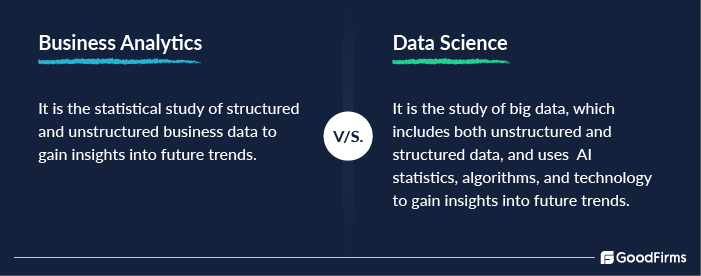
Business Intelligence Vs. Business Analytics Vs. Data Science - Detailed Comparison
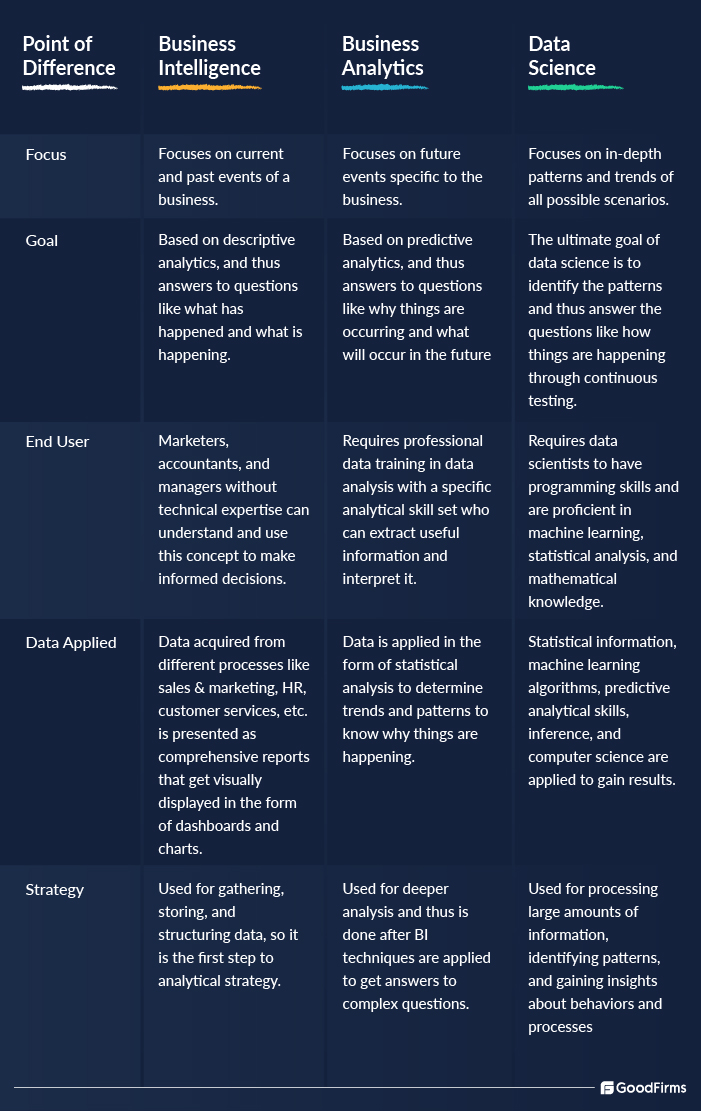
Selecting Business Intelligence, Business Analytics, and Data Science
Choosing the right method is a bit challenging. Here are a few tips:
Identify Goals
Defining the main goals of your business organization is important before you select your data analysis approach. If you need to only measure performance of your sales team, business intelligence software can suffice your needs but if you need to revise the roles of your sales team, business analytics would be the right choice. Data science should be used if forecasting sales brought by each team member is significant.
Consider Technical Skills of End-Users
Do you have resources having programming skills including knowledge of machine learning and artificial intelligence? If yes, you can implement data science into your analytics strategy. On the other hand, business analytics can be used by experts in specific analytical skills whereas, business intelligence can be used by users without any technical expertise. So, depending on the resources available, you can choose the technology for analyzing your data.
Check your Industry-Specific Use Cases
You can do some research and find out which analytical technology, tools and capabilities your competitors are using for creating opportunities and solving problems. For example, manufacturers can use business analytics to find out the preferences of the end-users to improvise their products and yield more sales. Whereas, online retailers might consider data science to provide personalized recommendations to their customers.
Finally, let's look at when to use business intelligence, business analytics, and data science.
When to use Business Intelligence?
You can use business intelligence tools when you require to-
- Measure Performance
- Perform Quantitative Analysis
- Report and share Data
- Identify Customer Insights
When to Use Business Analytics?
You can use business analytics tools when you require to-
- Analyze Data from Multiple Sources
- Monitor KPIs and Changing Trends in Real-Time
- Find Hidden Patterns in Large Datasets
- Revise Decisions Based on Updated Information
When to Use Data Science?
You can use data science tools when you require to-
- Provide Personalized Recommendations
- Forecast Sales of a Business
- Increase security and protect sensitive information
- Collect and analyze important data on a larger scale
Also, when you are -
- Equipped with technical human resources having knowledge of machine learning, and artificial intelligence
- High-level budget for R&D and forecasting
Conclusion
Analyzing data has become extremely important for every enterprise in this competitive environment. According to a Deloitte Survey -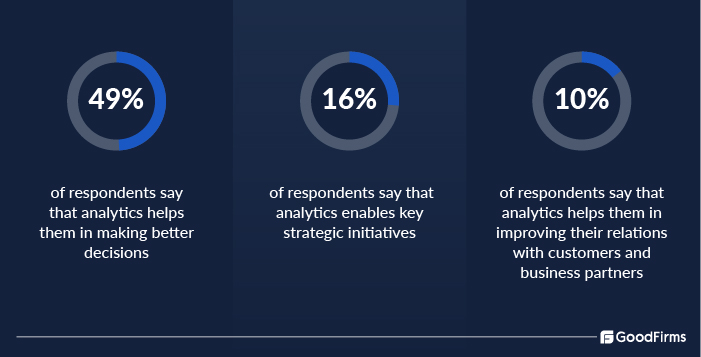 (Source: Deloitte)
(Source: Deloitte)
Organizations can gain meaningful insights from business intelligence, business analytics, and data science. Although, which technology should be used depends on the company's requirements, budget, and resources available. In many situations, the combination of business intelligence and business analytics can benefit, whereas, in some, business analytics and data science can yield the required results.
If you want to improve your operations, increase efficiencies and achieve organizational goals, business intelligence can be the right choice for you. But, if you require changing your business processes, using the right data analysis software becomes significant. When there is a massive volume of structured and unstructured data to be analyzed to derive actionable insights, data science becomes significant to use.
While these three concepts - business intelligence, business analytics, and data science are used to make decisions, their perspectives are different in terms of how decisions are made. Data science and business analytics focus on strategic planning and selecting future courses of action, whereas business intelligence assists in making decisions based on historical performance—data science and business analytics work towards forecasting the future but follow different approaches. Business analytics is based on statistical information, whereas data science follows an algorithm approach to deriving results.
Thus, business intelligence, business analytics, and data science contribute to gaining insights. Still, combining all three can bring the most significant benefit to businesses these days in terms of gaining a competitive advantage and improved revenue generation.






